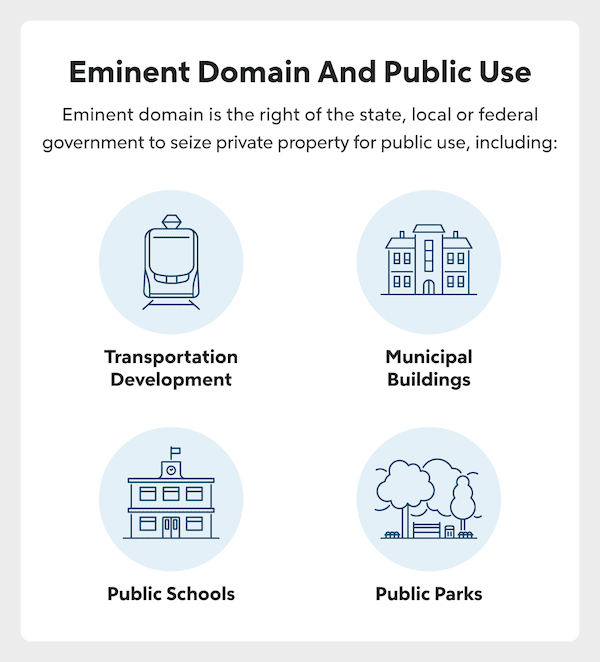Eminent domain refers to the government’s right to purchase private property for public use. A property owner doesn’t have to agree to the property transfer as long as just compensation is awarded.
Federal, state and municipal governments can claim eminent domain. This power is typically invoked when officials seek to build public works such as highways and roads that may run through privately owned properties.
Most homeowners will never be involved in an eminent domain proceeding. However, homeowners who feel their compensation is unjust or want to contest eminent domain may find themselves in court to defend their holdings.
Table Of Contents:

See What You Qualify For
Buy A Home
Discover mortgage options that fit your unique financial needs.

Refinance
Refinance your mortgage to have more money for what matters.
Tap Into Equity
Use your home’s equity and unlock cash to achieve your goals.
How Does Eminent Domain Work?
Eminent domain is evoked by government leaders when they want ownership of private property for public use projects, like roads or parks, or if a structure or property is a risk to public health.
At a base level, the process of invoking eminent domain operates as follows:
- The government decides that there is a pressing need to obtain specific land or property holdings for public use.
- Government leaders obtain approvals from governing bodies to move forward with a given project.
- The government conducts an assessment to determine a property’s fair market value.
- The property owner and government enter negotiations to agree on a fair sale price.
- If the property owner and civic leaders can’t reach an agreement, yet the government needs the land or buildings, it can exercise its power of eminent domain.
- The government files for a condemnation action in court and holds all necessary hearings.
- Property owners must receive a notice and an opportunity to appear in court. Objections can be filed orally or in writing (preferably in writing, with the help of an attorney).
- If the legislative body agrees to the government’s request, municipal leaders can file a legal complaint to obtain the property’s title in exchange for a fair market value payment.
- Owners can dispute this request in court.
Once the government claims eminent domain, they’ll assess the property to determine a fair market value. A proposed sales price will then be provided to property owners.
Property owners reserve the right to disagree with a proposed purchase price. If they do, it’s up to them to independently hire an appraiser or file an appeal in court to determine a final sales price.
Property Types That Can Be Claimed With Eminent Domain
Eminent domain most often applies to real estate property, but other property types can also be seized. These include:
- Real property Fixed property such as buildings, land, etc.
- Personal property: Assets you own besides real estate, such as cars and jewelry
- Intellectual property: A creative work or invention, like a design or manuscript
- Fiscal property: Cash, currency and other financial holdings
Types Of Taking To Know
Eminent domain cases don’t always involve the government taking complete ownership of a property, and different types of takings determine the property’s ownership and use.
- Permanent taking refers to full government acquisition of property without any intent to return ownership to the previous holder. It’s the most common eminent domain claim.
- Complete taking, also known as total taking, is when the government claims an entire property and compensates the owner with the fair market value considering its highest use.
- Partial taking occurs when the government takes a portion of the total property rather than the entire parcel.
- Temporary taking is when a government claims a private property for a set time period with the intent to return the parcel to its previous owner. This taking is applied for temporary projects like construction.
State and local laws vary, so consult your local government or a professional property attorney to learn more about your property rights.
Legal Requirements
Although government leaders reserve the right to pursue the public’s best interests, the power of eminent domain varies by location.
When a property owner and government can’t agree on a fair purchase price, the government must obtain legislative approval for a condemnation action to proceed with property acquisitions.
To get a condemnation action, legislators must determine if the proposed municipal project is:
- In the public’s interest
- Necessary
- Located or planned to promote the greatest public good and least public injury
- In pressing need of obtaining the property
- Offering an appropriate, data-backed purchase price
While owners may not agree with the case decision, the property may still be condemned. In any case, the owner is entitled to just compensation.
What Is Just Compensation?
Just compensation is the fair market value of your house determined by a home appraisal. It’s the amount of money the government pays a homeowner for their property when eminent domain is claimed.
Holdings in housing areas deemed less desirable will often prompt offers at a lower rate, so governments frequently look to developing or transitional areas of town as target sites for new construction.
Sample factors that may be used to determine property value include:
- Location
- Age
- Condition
- Past or current use
- Environment or zoning issues
- Current lease or contract agreements
Can You Refuse Eminent Domain?
If the government can’t prove that condemnation is necessary and a measure of public benefit or safety, a homeowner may be able to successfully contest eminent domain.
Homeowners can refuse the initial compensation offer, at which point the government officially exercises its power of eminent domain and files for condemnation action.
Property owners will be notified of any hearings and can appear in court and file objections orally or in writing. The homeowner can also provide their own property assessment to try and reach a larger fair market value.
The legislative body will then make its final decision. If the condemnation is approved, the homeowner will still receive compensation and can dispute the request in court. If the government can prove the condemnation meets expectations for the public’s use/interest and just compensation is awarded, they can complete their claim.
Eminent Domain FAQs
Looking for more information on eminent domains and how they work? Check out answers to these common questions below.
What Are Examples Of Eminent Domain?
Common examples of eminent domain include governments acquiring properties to build roads, schools, municipal buildings and other public projects. It can also be used to protect historic structures or to get property for projects like gas lines.
You can learn more examples of eminent domain in real estate with these cases:
- Hawaii Housing Authority v. Midkiff: Hawaii enacted the Land Reform Act of 1967 to transfer the title of select privately owned properties to their renters. At the time, 47% of Hawaiian land was owned by 72 owners.
- Kelo v. New London: New London, Connecticut seized private property through eminent domain and sold it to private developers to promote economic growth. The property owners contested that selling to private owners wasn’t for public use, but lost the case.
- Penn Central Transportation Company v. New York City: Penn Central was interested in building a 50-story office building above the Grand Central Station it owned, but was stopped by the city because the property was a protected landmark. The owners argued the interference constituted “taking” under eminent domain and sued for just compensation, but lost.
Is Eminent Domain Protected By The Constitution?
The power of eminent domain is considered to be an “attribute of sovereignty,” or a natural condition of the government’s power. However, the Fifth Amendment does guarantee some rights for property owners to receive just compensation. The amendment specifically states:
“Nor shall private property be taken for public use, without just compensation.”
In addition to the right to receive just compensation, you also have the right to due process. If you are forced to relocate as a result of the taking, the United States government is responsible for providing you with select relocation benefits as well.
Typical relocation benefits include moving assistance for personal property and reestablishment costs in the case of moving a business. You may also be eligible for additional damages depending on constraints and hardships imposed upon you as a result of the relocation.
Consult with legal and financial experts if you have questions regarding any proposed expenses, which often require negotiations with the governing body responsible for the eminent domain action.
What Are The Requirements For Eminent Domain?
Requirements vary by state and city, but the government seizing the property must generally prove that their intent for the property must:
- Serve public interest
- Be necessary
- Promote the greatest public good and least public injury
- Have a pressing need for the property
- Offer an appropriate, data-backed purchase price
It’s important to know that there aren’t any specific guidelines for what serves the public’s interest, so eminent domain can be difficult to contest. Examples of cities acquiring land to build sports stadiums or to sell to private companies with the promise of economic growth aren’t unheard of or uncontroversial.
What Is Eminent Domain? A Summary
The right of eminent domain allows governments to seize property if there’s a pressing public interest. But as a property or land owner, you also reserve legal rights to challenge related actions and receive just compensation for your holdings.
Should you find yourself facing a potential relocation or dispute over fair market value, be sure to consult with qualified experts, including an attorney. You may be entitled to more compensation and assistance than what’s being proposed.

Victoria Araj
Victoria Araj is a Staff Writer for Rocket Companies who has held roles in mortgage banking, public relations and more in her 15-plus years of experience. She has a bachelor’s degree in journalism with an emphasis in political science from Michigan State University, and a master’s degree in public administration from the University of Michigan.












